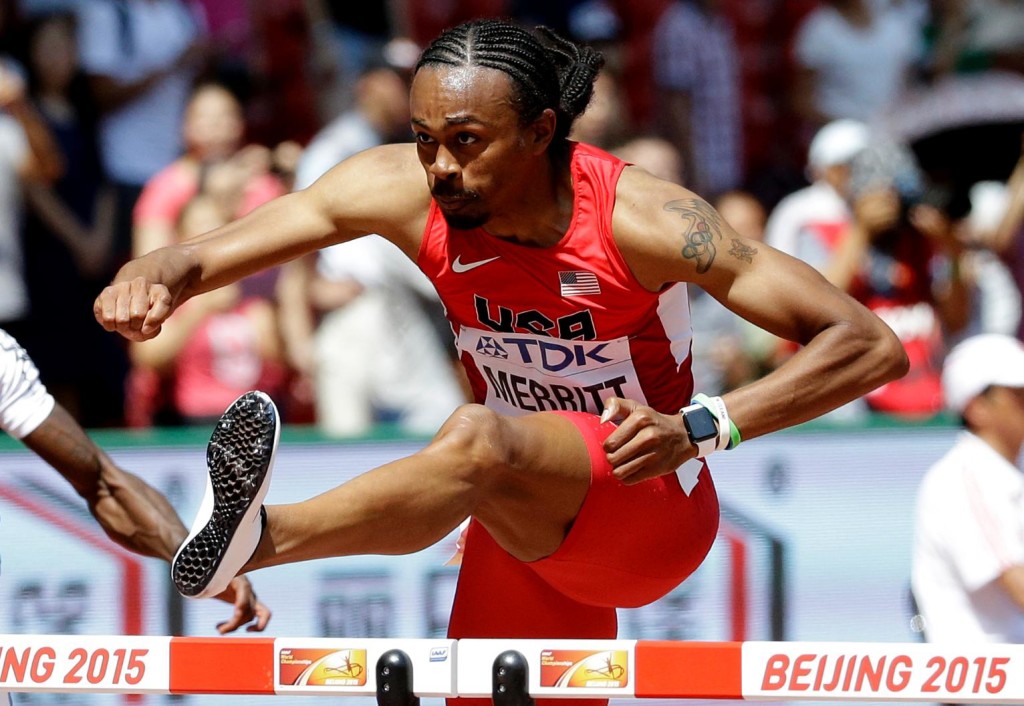Aries Merritt, a Warrior for the Ages
While I was planning to write an article lamenting the lack of gold medals in the hurdles at the World Championships this past August, I think I’ll wait until next month before I do that. Right now, it doesn’t seem a proper thing to do in light of the story that has recently emerged regarding the health battle that 110m world record holder Aries Merritt has been fighting with kidney disease over the past couple years, unbeknownst to everybody and anybody, except, I assume, for his coach, immediate family, and close friends.
[am4show not_have=’g5;’]
[/am4show][am4guest]
[/am4guest][am4show have=’g5;’]
Now let’s be clear that anyone who runs over ten 42-inch barrier spaced 10 yards apart for a living is a warrior of the highest order. I’m not here to say that Merritt is any more of a warrior than anyone else who lines up at the starting line with the spiked shoes laced up. One thing I’ve learned over the years, especially through the many interviews I’ve conducted on this website, is that everyone has a story, and that everyone’s story is pretty incredible. The sacrifices athletes make, the adversity they rise above, the physical, emotional, and spiritual challenges they have to overcome on a regular basis always leave me feeling like I’ve just talked to a very special human being.
Stories like Merritt’s hold a special place in my heart for the simple reason that I can relate. As I’ve discussed in a few previous articles for this website, I survived a life-threatening illness when I was seventeen years old. As a senior in high school, I was diagnosed with a rare blood disease, aplastic anemia, after feeling excessive fatigue over a period of several months.
Starting in March of my junior year, through the summer, then into late October of my senior year, I gutted it out, ignored what I later knew to be obvious symptoms, and kept hoping the next day would be better. Until finally, when I couldn’t walk up a flight of stairs without taking a break halfway up, I finally admitted I must be sick, that I couldn’t be that out of shape.
My doctors at the Children’s Hospital of Philadelphia were able to cure me, I was able to complete my senior year, and I starred on the track team.
To my coaches and teammates, I was a hero. I was a miracle. I won the team MVP award because of the courage I’d shown. My coaches hadn’t expected me to come back at all. Yet I did come back, and won the conference championship.
In my mind, I hadn’t been any more courageous than any of my teammates, especially Rich Dunham, who had dominated the 400 and the 800, but injured himself at the conference meet trying to earn the team more points in the long jump. I didn’t have a clear idea yet of how much an inspiration someone is who comes back from the dead.
Now I do. In the case of Aries Merritt, you have a guy who had already reached the pinnacle of success in the event. A guy who redefined greatness in the 110s with his 2012 campaign. Expectations were, of course, sky high heading into 2013, but instead it was fellow Americans David Oliver and Ryan Wilson who shined. In 2014, it was Pascal Martinot-Lagarde.
Heading into 2015, expectations had dwindled. Prior to 2012, Merritt had had a hot and cold career marred by nagging injuries, so most of us assumed that, after his 2012,dream season, the nagging injuries had come back. Or maybe reaching the top, earning an Olympic gold medal, and smashing the world record had compromised his motivation. After all, the grind of competing, traveling, training, and maintaining a living through track can be enough to wear anybody down.
But what none of us knew was that Merritt was suffering from kidney disease. He didn’t want anyone to know because he didn’t want to make any excuses. Slowly, his condition was deteriorating, to the point where he would need a donor for a transplant. Through it all, he trained as much as he could, competed as well as he could. Even his own training partners were not sure what was wrong.
News of Merritt’s kidney ailment did not become public until shortly before the World Championships in late August. I know that when I first saw the headlines, I assumed his sickness hadn’t reached too serious of a stage yet, or else he wouldn’t still be planning to compete. Nobody, I assumed, can jog around the block, much less race over 10 high hurdles at full speed, with failing kidneys.
But as I read further, it became evident that that’s exactly what Merritt had been doing for two years, and that that was what he was planning to do at the World Champs.
Not only did he compete, but he medaled, battling through three rounds, earning a third-place finish in the final and a spot on the victory stand. He would later say that the bronze he won this year was much more gratifying than the gold he won in 2012. I can certainly believe that, and I can certainly understand why.
The latest news is that Merritt has received a kidney donated by his sister, and that both are recovering well. Does he still plan on making another Olympic run in 2016? Yes, it looks that way.
***
Everybody has a story. Off the top of my head, I can name two athletes I’ve coached who have battled back (or are battling back) from acl tears, I can name one who battled back from a broken ankle, and plenty who have fought through injuries that would have crippled athletes of lesser will.
But what makes Aries’ story stand out is the life-threatening aspect of it. I know that in my case back when I was diagnosed with aplastic anemia, as is the case for anyone who has dedicated him or herself to the hurdles, it was the desire to hurdle again that kept me from giving up on life through the darkest moments of despair. It was the love of hurdling, and the longing to return to it, that made me choose life when death was knocking at the door. Yes, I had the best doctors and the best nurses caring for me. And I had my family supporting me, my coaches and friends checking up on me. But if not for the hurdles, I don’t know if any of that would’ve mattered.
That seems to be the case with Aries as well. It’s not normal to run hurdles when your kidneys are failing. Which is why I have mad respect for the man.
Links:
http://abcnews.go.com/Sports/wireStory/hurdler-aries-merritt-mend-kidney-transplant-33650446
http://www.iaaf.org/news/feature/aries-merritt-hurdles-kidney-disease
[/am4show]


